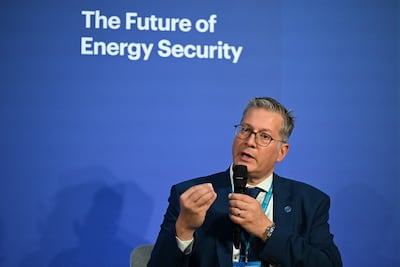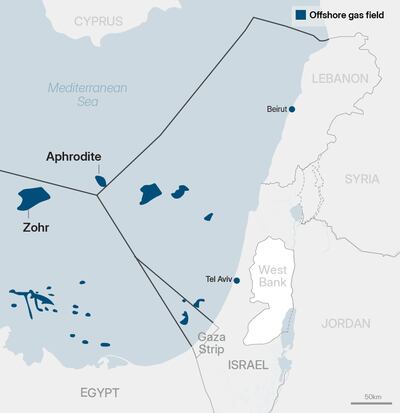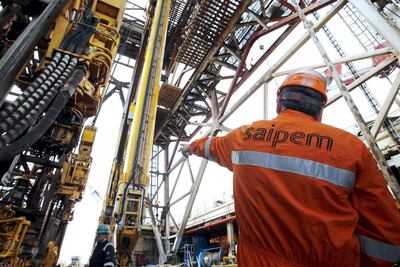Egypt is planning to unlock Mediterranean gas reserves to meet the “energy needs” of the whole region, the country’s energy minister has told The National.
Karim Badawi also spoke about forming a broader collaboration with other countries “to maximise the value of Egypt as a regional hub” for energy supply.
Cairo and Nicosia signed an agreement in February that enables the export of gas from Cyprus's offshore fields to Egypt for liquefaction and subsequent export to Europe. Both countries are aiming to make the Eastern Mediterranean a larger energy hub.
Speaking at the Future of Energy Security conference in London, Mr Badawi stated that the Ministry of Petroleum and Mineral Resources that he leads would “unlock the whole subsurface potential and provide the energy needs not only of Egypt but for the region”.
There would also be “regional collaboration to maximise the value of Egypt as a regional hub,” he added.
Under the deal with Cyprus, reserves from the island's Cronos field will be exported to Egypt, where existing infrastructure is in place to process and ship liquefied natural gas on to European markets.
Mr Badawi said his country wanted to “leverage the infrastructure” to provide the energy needs “for the common benefit not only of the people of Egypt, but for Europe and the rest of the world”.
The Eastern Mediterranean has yielded some major gas discoveries in recent years, and the disruption in supplies from Russia after its invasion of Ukraine in 2022 has focused Europe's attention on securing supplies elsewhere.
The Cronos deal, which is estimated to be for more than 4.5 trillion cubic feet of gas, also helps Egypt combat declining domestic gas production.
Italian energy company Eni, along with French energy giant TotalEnergies, agreed to send the gas extracted from the Cronos Block 6 site and send it for processing at Egypt's Zohr facility before it is liquefied at the Nile Delta’s Damietta plant.
Progress on another promising gasfield was announced earlier this year. The Aphrodite field was discovered in 2011 and is believed to contain 4.4 trillion cubic feet (125 billion cubic metres) of natural gas. It lies west of Israel's Leviathan gasfield in the eastern Mediterranean.
Chevron Cyprus holds a 35 per cent operator interest in the Aphrodite field. Shell's BG Cyprus Limited holds 35 per cent and the Israeli energy giant NewMed holds the remaining 30 per cent stake.
Meanwhile, Egypt is also attempting to transition away from fossil fuels. It is aiming to “provide the right energy mix” and have 42 per cent of power coming from renewables by 2030, Mr Badawi said.
He also reflected on the new challenges facing renewable energy, highlighted by IEA boss Dr Fatih Birol on the energy security conference’s opening day on Thursday. Among them, he said, are “risks” posed by the concentration of critical minerals in a few countries.
“Mining for critical minerals is very important in the energy transition and also, obviously, for deployment of renewable energies and the future transition technologies,” Mr Badawi said.
He added that the conference, held in Lancaster House, London, was “very important because energy is at the forefront of driving economies, in any part of this world”.
Yahya Al Ghassani's bio
Date of birth: April 18, 1998
Playing position: Winger
Clubs: 2015-2017 – Al Ahli Dubai; March-June 2018 – Paris FC; August – Al Wahda
Zodi%20%26%20Tehu%3A%20Princes%20Of%20The%20Desert
%3Cp%3E%3Cstrong%3EDirector%3A%20%3C%2Fstrong%3EEric%20Barbier%26nbsp%3B%3C%2Fp%3E%0A%3Cp%3E%3Cstrong%3EStarring%3A%20%3C%2Fstrong%3EYoussef%20Hajdi%2C%20Nadia%20Benzakour%2C%20Yasser%20Drief%3C%2Fp%3E%0A%3Cp%3E%3Cstrong%3ERating%3A%3C%2Fstrong%3E%204%2F5%3C%2Fp%3E%0A
UAE currency: the story behind the money in your pockets
APPLE IPAD MINI (A17 PRO)
Display: 21cm Liquid Retina Display, 2266 x 1488, 326ppi, 500 nits
Chip: Apple A17 Pro, 6-core CPU, 5-core GPU, 16-core Neural Engine
Storage: 128/256/512GB
Main camera: 12MP wide, f/1.8, digital zoom up to 5x, Smart HDR 4
Front camera: 12MP ultra-wide, f/2.4, Smart HDR 4, full-HD @ 25/30/60fps
Biometrics: Touch ID, Face ID
Colours: Blue, purple, space grey, starlight
In the box: iPad mini, USB-C cable, 20W USB-C power adapter
Price: From Dh2,099
The%20Roundup
%3Cp%3EDirector%3A%20Lee%20Sang-yong%3Cbr%3EStars%3A%20Ma%20Dong-seok%2C%20Sukku%20Son%2C%20Choi%20Gwi-hwa%3Cbr%3ERating%3A%204%2F5%3C%2Fp%3E%0A
NEW%20PRICING%20SCHEME%20FOR%20APPLE%20MUSIC%2C%20TV%2B%20AND%20ONE
%3Cp%3E%3Cstrong%3EApple%20Music%3Cbr%3EMonthly%20individual%3A%20%3C%2Fstrong%3E%2410.99%20(from%20%249.99)%3Cstrong%3E%3Cbr%3EMonthly%20family%3A%20%3C%2Fstrong%3E%2416.99%20(from%20%2414.99)%3Cstrong%3E%3Cbr%3EIndividual%20annual%3A%20%3C%2Fstrong%3E%24109%20(from%20%2499)%3C%2Fp%3E%0A%3Cp%3E%3Cstrong%3EApple%20TV%2B%3Cbr%3EMonthly%3A%20%3C%2Fstrong%3E%246.99%20(from%20%244.99)%3Cstrong%3E%3Cbr%3EAnnual%3A%20%3C%2Fstrong%3E%2469%20(from%20%2449.99)%3C%2Fp%3E%0A%3Cp%3E%3Cstrong%3EApple%20One%3Cbr%3EMonthly%20individual%3A%20%3C%2Fstrong%3E%2416.95%20(from%20%2414.95)%3Cstrong%3E%3Cbr%3EMonthly%20family%3A%20%3C%2Fstrong%3E%2422.95%20(from%20%2419.95)%3Cstrong%3E%3Cbr%3EMonthly%20premier%3A%20%3C%2Fstrong%3E%2432.95%20(from%20%2429.95)%3C%2Fp%3E%0A
The specs: 2019 BMW i8 Roadster
Price, base: Dh708,750
Engine: 1.5L three-cylinder petrol, plus 11.6 kWh lithium-ion battery
Transmission: Six-speed automatic
Power: 374hp (total)
Torque: 570Nm (total)
Fuel economy, combined: 2.0L / 100km
World Cricket League Division 2
In Windhoek, Namibia - Top two teams qualify for the World Cup Qualifier in Zimbabwe, which starts on March 4.
UAE fixtures
Thursday February 8, v Kenya; Friday February 9, v Canada; Sunday February 11, v Nepal; Monday February 12, v Oman; Wednesday February 14, v Namibia; Thursday February 15, final
How to report a beggar
Abu Dhabi – Call 999 or 8002626 (Aman Service)
Dubai – Call 800243
Sharjah – Call 065632222
Ras Al Khaimah - Call 072053372
Ajman – Call 067401616
Umm Al Quwain – Call 999
Fujairah - Call 092051100 or 092224411
The biog
Family: He is the youngest of five brothers, of whom two are dentists.
Celebrities he worked on: Fabio Canavaro, Lojain Omran, RedOne, Saber Al Rabai.
Where he works: Liberty Dental Clinic
Tips for taking the metro
- set out well ahead of time
- make sure you have at least Dh15 on you Nol card, as there could be big queues for top-up machines
- enter the right cabin. The train may be too busy to move between carriages once you're on
- don't carry too much luggage and tuck it under a seat to make room for fellow passengers
UAE SQUAD FOR ASIAN JIU-JITSU CHAMPIONSHIP
Men’s squad: Faisal Al Ketbi, Omar Al Fadhli, Zayed Al Kathiri, Thiab Al Nuaimi, Khaled Al Shehhi, Mohamed Ali Al Suwaidi, Farraj Khaled Al Awlaqi, Muhammad Al Ameri, Mahdi Al Awlaqi, Saeed Al Qubaisi, Abdullah Al Qubaisi and Hazaa Farhan
Women's squad: Hamda Al Shekheili, Shouq Al Dhanhani, Balqis Abdullah, Sharifa Al Namani, Asma Al Hosani, Maitha Sultan, Bashayer Al Matrooshi, Maha Al Hanaei, Shamma Al Kalbani, Haya Al Jahuri, Mahra Mahfouz, Marwa Al Hosani, Tasneem Al Jahoori and Maryam Al Amri
Fixtures
Tuesday - 5.15pm: Team Lebanon v Alger Corsaires; 8.30pm: Abu Dhabi Storms v Pharaohs
Wednesday - 5.15pm: Pharaohs v Carthage Eagles; 8.30pm: Alger Corsaires v Abu Dhabi Storms
Thursday - 4.30pm: Team Lebanon v Pharaohs; 7.30pm: Abu Dhabi Storms v Carthage Eagles
Friday - 4.30pm: Pharaohs v Alger Corsaires; 7.30pm: Carthage Eagles v Team Lebanon
Saturday - 4.30pm: Carthage Eagles v Alger Corsaires; 7.30pm: Abu Dhabi Storms v Team Lebanon
Rafael Nadal's record at the MWTC
2009 Finalist
2010 Champion
Jan 2011 Champion
Dec 2011 Semi-finalist
Dec 2012 Did not play
Dec 2013 Semi-finalist
2015 Semi-finalist
Jan 2016 Champion
Dec 2016 Champion
2017 Did not play
Where can I submit a sample?
Volunteers can now submit DNA samples at a number of centres across Abu Dhabi. The programme is open to all ages.
Collection centres in Abu Dhabi include:
- Abu Dhabi National Exhibition Centre (ADNEC)
- Biogenix Labs in Masdar City
- Al Towayya in Al Ain
- NMC Royal Hospital in Khalifa City
- Bareen International Hospital
- NMC Specialty Hospital, Al Ain
- NMC Royal Medical Centre - Abu Dhabi
- NMC Royal Women’s Hospital.
WHAT%20MACRO%20FACTORS%20ARE%20IMPACTING%20META%20TECH%20MARKETS%3F
%3Cp%3E%E2%80%A2%20Looming%20global%20slowdown%20and%20recession%20in%20key%20economies%3C%2Fp%3E%0A%3Cp%3E%E2%80%A2%20Russia-Ukraine%20war%3C%2Fp%3E%0A%3Cp%3E%E2%80%A2%20Interest%20rate%20hikes%20and%20the%20rising%20cost%20of%20debt%20servicing%3C%2Fp%3E%0A%3Cp%3E%E2%80%A2%20Oil%20price%20volatility%3C%2Fp%3E%0A%3Cp%3E%E2%80%A2%20Persisting%20inflationary%20pressures%3C%2Fp%3E%0A%3Cp%3E%E2%80%A2%20Exchange%20rate%20fluctuations%3C%2Fp%3E%0A%3Cp%3E%E2%80%A2%20Shortage%20of%20labour%2Fskills%3C%2Fp%3E%0A%3Cp%3E%E2%80%A2%20A%20resurgence%20of%20Covid%3F%3C%2Fp%3E%0A





